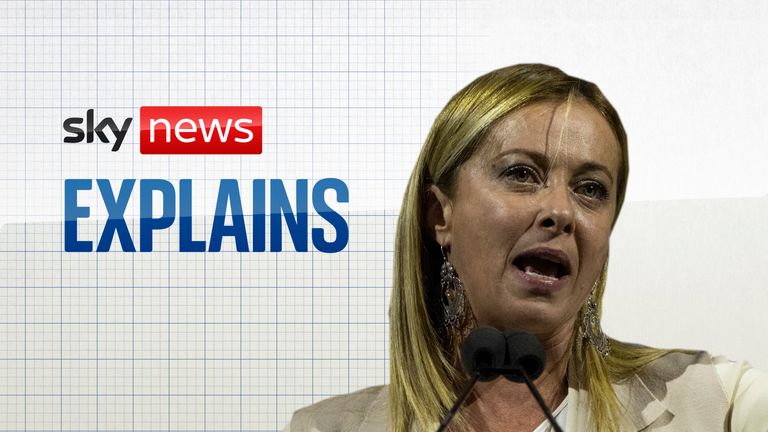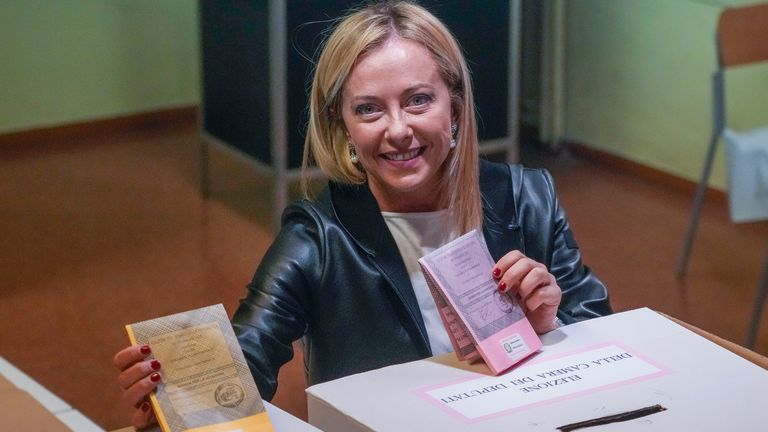Giorgia Meloni left it very late to vote. It was dark when she arrived at the polling station, and she was lit up by the flashes of cameras and phones. The limelight has found her.
Four years ago, Ms Meloni and her Brothers of Italy party were also-rans in the last general election. Now, they are the biggest party and she is bound to be anointed as the country’s next prime minister – the first woman in Italy‘s history to take the job.
Italy will move to the right. The question is just how far and to answer that, you have to try to work out what Ms Meloni is – and what she isn’t.
First, let’s be clear – she’s not a fascist. Yes, the logo of her party is a hangover from its fascist origins and, yes, the teenage Ms Meloni once expressed her admiration for Mussolini’s leadership qualities.
But no, she’s not a fascist, a word that gets thrown around far too carelessly.
She does have strong right-wing opinions – she’s socially conservative, for instance, opposes children being adopted by gay couples and idealises the model of the classic strong and supportive Italian family unit. By contrast, she was brought up by a single mother and says she was bullied as a child.
She links illegal immigration to crime and prostitution, says she is against “woke politics”, rallies about the effects of globalism and has come up with “Made in Italy” as her own slogan of home-grown populism.
But is her brand of politics really extreme or even unusual? When we spoke, she told me she admires Ronald Reagan and Margaret Thatcher. She’s created friendly links with the American Republicans and would like to move closer to Britain’s Conservative party. Like Liz Truss, she sees tax cuts as an important first step in proving her credentials.
And, just like the British prime minister, she’s going to have to find a way of paying for that largesse. That’s a problem for Ms Truss, but a much bigger one for Ms Meloni – Italy’s national debt is already about 150% of GDP.
Ms Meloni has talked about building infrastructure as a form of economic stimulus, improving training programmes for young people and says she will maintain Italy’s support for Ukraine. None of those plans are really going to frighten anyone.
She’s even forged an unlikely friendship with the outgoing Prime Minister Mario Draghi, who has been offering her his thoughts on how to manage the Italian economy and maintain decent relations with the European Union. It’s quite hard to imagine Mr Draghi, still an enormously popular figure, offering a helping hand to someone he considered a danger to the nation.
Read more: Who is Giorgia Meloni?
The truth is that she’s hard to compartmentalise. At some rallies, she can sound furious with the world; at others, emollient and optimistic. When I spoke to her earlier this week, Ms Meloni told me she sees herself as a centre-right politician and insisted that the only people who should fear her are rival politicians on the left. Certainly, she’s closer to the centre than her firebrand coalition partner, Matteo Salvini.
Managing the machinations of Mr Salvini, who will be keen to take over as interior minister and so make his mark on immigration, will be one of her main challenges. She will also have to control another of her coalition partners, Silvio Berlusconi, soon to celebrate his 86th birthday and still the showman of Italian politics.
But Ms Meloni will do all this from a position of strength. The Italian public are fed up with most of their politicians, reflected in the disenchantment that marked this election campaign and the subsequent dismal turnout – the worst in Italy’s history.
The Five Star Movement, which once seemed so disruptive, suffered a slump in popularity and there was widespread irritation that Mr Draghi, who was not aligned to any party, was forced out of office.
The nation’s left wing failed to come up with either a coalition or a compelling vision.
It meant that, despite having up to 12 parties to choose from, many Italians came to the conclusion that they didn’t really want any of them, and so stayed at home.
But the one group that did seem enthusiastic about going to the polls were those who wanted Ms Meloni and her right-wing coalition. Turnout was higher in the north, traditionally conservative, than in the south, which tends to vote for left-wing parties.
Italy’s famously complex political process will now go through its motions, before Ms Meloni is named as prime minister and left to fulfil her promises.
Then, we’ll find out which route she goes down – a populist such as Viktor Orban, intent on exerting ever more control; a pugilist such as Poland’s Mateusz Morawiecki, or a more familiar conservative voice such as Liz Truss? Or something else completely?
A huge amount of speculation, praise, criticism and gossip has been written about Ms Meloni, and rightly so. She will lead one of the world’s most wealthy and influential nations – a G7 member and the third biggest economy in the EU. Italy matters, so it’s right that we wonder what Ms Meloni really is. Now, in the coming months, we will find out.



